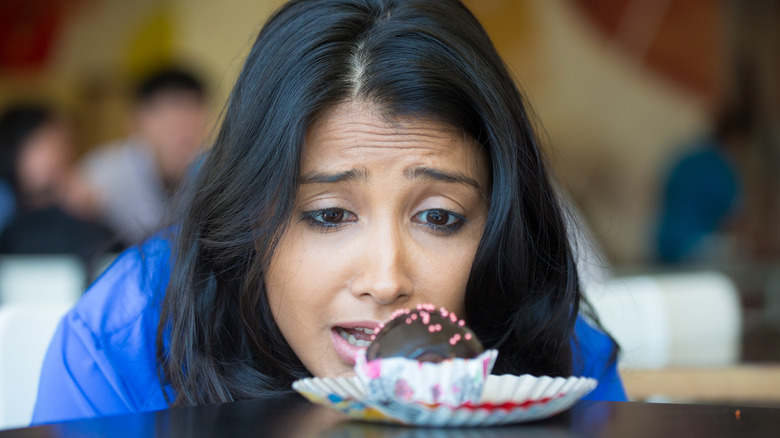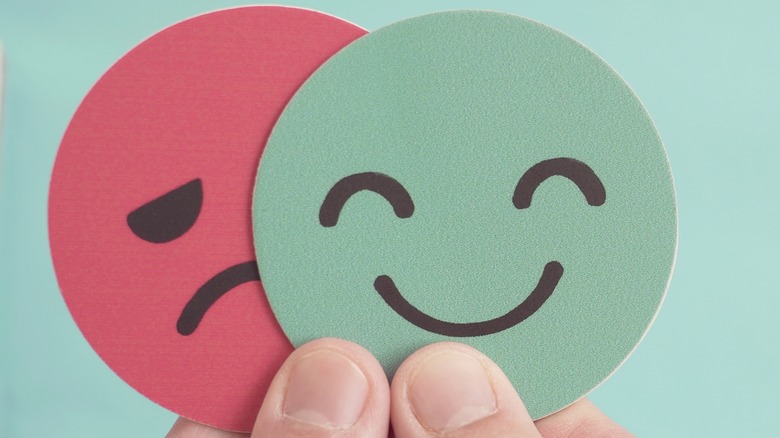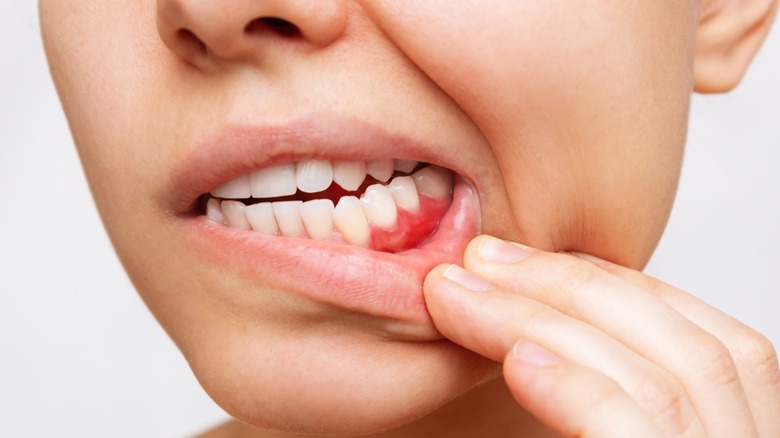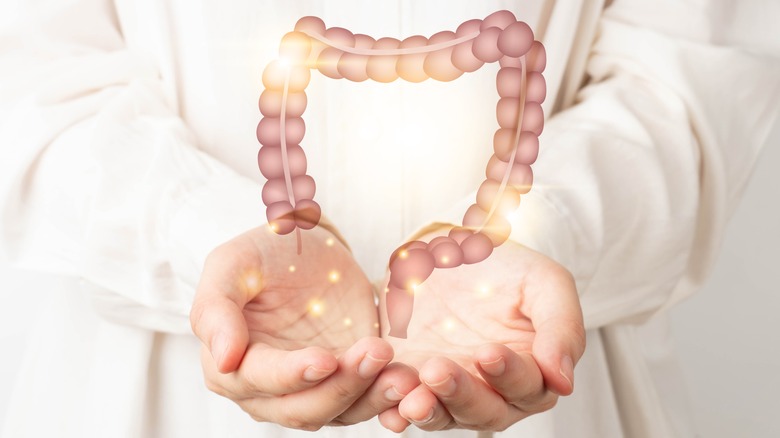When You Eat Too Much Candy, This Is What Happens To You
It probably won't come as a surprise to know that eating loads of candy might have negative consequences for your health. However, sometimes knowing the science behind why it's so bad for you can give you a much needed push to cut back. What makes candy so delicious (and so harmful) is its high quantities of sugar, which research has proven time and time again is linked to a number of health conditions. As Livestrong explains, when eaten regularly and in excess, candy may be taking the place of other foods that are good for your health. The site explains that the American Heart Association suggests adults consume only 100 to 150 calories a day from sugar. And because every gram of sugar contains approximately four calories, eating one candy bar that contains 25 grams of sugar can easily meet your recommended value for the day all on its own (via Livestrong). If you have a hard time stopping at one candy bar, or reach for more sugar later on in the day, it's easy to see how fast your sugar intake can spiral out of control. If you want to learn more about how sugar can negatively affect your body, continue reading.
Boost of energy as blood sugar rises
There's no doubt about it: That initial rush of energy you get when you eat a candy bar feels good. In case you were wondering just why, Livestrong explains that the high you're feeling after eating a sugary snack is your body's way of refueling energy. Although sugar is not a stimulant the way caffeine is, it will give you a "burst" of energy that has a similar effect. As for how all this happens, experts explain that as the body extracts glucose from high-sugar foods like candy, insulin is released from the pancreas, which leads the cells to absorb that glucose. This process "fuels cells throughout the body," which is what provides that characteristic spike of energy.
The body absorbs glucose from several different sources, including from carbohydrates, and even from fat and protein. With that said, the body absorbs glucose the fastest from fructose, which Healthline explains "is one of the two major components of added sugar." While fructose can be found in high levels in fruit, Healthline explains that the fiber and nutritional value found in fruit makes it hard to overeat. Fructose in the form of added sugar, on the other hand, is easier to overindulge in, which can mean bad news for your health.
Jitters and anxiety
Ever heard the adage "what goes up must come down"? Like it or not, this saying most definitely applies to those sky-high levels of energy you feel after eating boat loads of candy. Take heed, because that rush you get after eating your favorite candy bar will soon make way for what is known as the dreaded "sugar crash," which can lead to feelings of jitters and even anxiety. As Sanford Health explains, while you may experience a sugar crash after eating carbs from foods like white bread, you will likely feel the effects more strongly from eating simple sugars, such as the type found in candy.
According to Sanford Health, while the body needs certain levels of sugar to function at optimum capacity, it also needs those levels of sugar to remain stable. When you exceed the amount of sugar your body is used to, your body produces insulin, which is actually its way of trying to even out the amount of sugar in your blood. This surge in insulin eventually leads to a drop in blood sugar, which can come along with unwanted emotional symptoms such as irritability and anxiety. If you've already done the damage by binging on a bunch of sugar, there is a fix (and no, it's not eating more sugar). Experts at Sanford Health suggest eating protein, which can help the body balance out glucose levels.
Low libido
If your sex drive has taken a hit and you're wondering what the possible causes may be, it could be as simple as your daily candy habit. While there are many factors that can affect your libido — and it can be a maze trying to get to the root — experts at MindBodyGreen explain that sugar can be a contributing factor to why you might not be in the mood. The way sugar does this is by affecting your hormone levels. Sugar raises insulin levels, which can lead to a "domino effect" with your hormones, throwing them out of whack, according to the site. One of the hormones most directly affected by sugar is testosterone, which is one of the hormones that is responsible for our sex drive. When testosterone is low, you might feel a lack of desire, and may gain weight and lose muscle mass, which can further contribute to a lack of motivation in the bedroom. According to a study published by Advances in Nutrition, sugar also affects the levels of leptin in the body, which experts say can further affect levels of testosterone in the body. Additionally, because sugar is associated with stress and low levels of energy, this can also negatively impact your libido.
Weight gain
Weight gain may be the least surprising side effect of eating too much candy. There are several ways consuming sugar can lead to more pounds (via Medical News Today), and perhaps one of the more obvious ones is that candy typically tends to be calorie-dense (via Calories.info). Furthermore, in one particular study published by The BMJ, researchers found that people who increased their sugar consumption gained a considerable amount of weight compared to those who decreased their consumption of sugar. Experts at Medical News Today also explain that because the body processes added sugar faster than other types of food, candies and other sweets don't tend to keep you full for long. This means that after having a candy bar, you're more likely to continue snacking throughout the day, adding on to the already high calorie count.
Sugar consumption can also affect the amount of leptin produced in the body, leading to dysfunction in how it operates in the body — and leptin resistance can also lead to weight gain and obesity. While Medical News Today notes that sugar itself may not specifically be the cause of weight gain, it is a contributing factor, and limiting it is a straightforward way to help prevent packing on pounds.
Sugar cravings
If you've ever had one of those days where one piece of candy seemed to lead to the next...and then the next, then you already understand how this one works. When people say that they are "addicted to candy," it might seem cute or even trivial, but science says those incessant candy cravings may actually be quite serious. If you thought cutting sugar out of your diet would be as easy as tossing those bags of Skittles in the trash, experts at the Addiction Center reveal that some studies show that sugar can actually be as addictive as cocaine. Yep.
Healthline explains that people gravitate toward sugar because it releases both dopamine and opioids, which can both contribute to addictive behavior according to the site. Cassie Bjork, RD, LD, founder of Healthy Simple Life, explains just how this process works. "Sugar activates the opiate receptors in our brain and affects the reward center, which leads to compulsive behavior, despite the negative consequences like weight gain, headaches, hormone imbalances, and more." she explained. "Every time we eat sweets, we are reinforcing those neuropathways, causing the brain to become increasingly hardwired to crave sugar, building up a tolerance like any other drug."
Depression
If you've found yourself hooked on the sweet stuff, you may have realized your mood tends to swing from one extreme to another somewhat haphazardly. While there may be a number of factors contributing to variations in your mood, don't be quick to rule out sugar as a possible element. Healthline explains that in addition to the good feelings we get from eating sugar, sugar has a way of affecting our mood more negatively. Research suggests that eating sugar in excess can actually lead to depression as well as other mood disorders. One particular study published by The British Journal of Psychiatry observed nearly 3,500 participants and found that those who ate processed foods, which included sweetened desserts, experienced increased odds of depression compared to those who ate unprocessed whole foods.
Furthermore, in one meta-analysis published in Neuroscience & Biobehavioral Reviews, researchers worked with people who were dealing with major depression and who were also insulin resistant. It found that treating the people with medication used to manage diabetes significantly reduced their symptoms of depression.
Acne and wrinkles
If you have been dealing with skin concerns and are wondering if the candy in your diet may have something to do with it, science says there could indeed be a potentially strong connection. Skincare experts and dermatologists spoke to Insider to explain the relationship between excess sugar consumption and skin conditions. They explained that eating foods that are high on the glycemic index, such as many candies, can create inflammation in the body. Dr. Donna Hart, board-certified dermatologist at Westlake Dermatology & Cosmetic Surgery, spoke to the site and said that when insulin levels increase as a result of eating sugar, that can trigger inflammation in the skin. Because increased inflammation is linked to acne, you might experience "flare-ups" as a result of that sugar binge. Sugar can trigger or worsen other skin conditions as well, including eczema, rosacea, and psoriasis, which are also linked to inflammation.
On top of these issues, sugar can also accelerate the aging process. Dr. Hart explained that "sugars basically bind with collagen to form something called advanced glycation end products (AGEs)." After this binding process occurs, the collagen in your skin becomes "stiff and brittle," which can make your skin look older.
Cavities
Having too much of a sweet tooth can lead you to developing teeth that will send you straight to the dentist. It's been drilled into us (pun intended) since we were young, but eating too much candy is directly linked to the formation of cavities.
Healthline explains that our mouths are filled with both beneficial and not so beneficial bacteria. When we consume sugar, some of those not-so-beneficial bacteria produce a certain type of acid that can destroy the minerals that make up the enamel (the shiny outer layer) on your teeth. Fortunately, our saliva contains minerals including calcium and phosphate, which can help "remineralize" your teeth, repairing that damage. However, if sugar is consistently consumed, the excess acidity produced by the bacteria can eventually lead to an overall loss of enamel, wearing it down enough to the point where a cavity is formed.
The site also explains that those aforementioned bad bacteria love sugar, and will feed on it, disrupting the delicate pH balance in your mouth, and forming what is called dental plaque. If not properly cleansed off the teeth, that plaque can also create cavities. And in particular, hard, sticky candies like lollipops are more often linked to tooth decay because of the amount of time the sugary residue remains on your teeth.
Increased inflammation
The excess insulin produced by consuming sugar can cause inflammation in the body, which can lead to a host of concerns. Experts at Medical News Today confirm that a diet high in refined sugar — the kind commonly found in candy, per MD Anderson Cancer Center — can lead to chronic inflammation, which is linked to a number of diseases including heart disease, arthritis, and Alzheimer's. Indeed, a review published by the journal Nutrients that explains that dietary sugar has been linked to increased "inflammatory markers" in blood. Research has shown that sugar stimulates the "production of free fatty acids in the liver," which when digested by the body may trigger inflammation. Some of the symptoms associated with inflammation include mood disorders such as anxiety and depression, pain, constant fatigue, weight gain, and frequent infections, to name a few.
According to Medical News Today, studies have shown that people who consume less sugar have less inflammation, so cutting back on sugar is a good way to help reverse its effects. However, sugar may not be the only dietary source of inflammation, so if you're not sure where to start, switching to an anti-inflammatory diet may be your best bet.
Diabetes
While it might seem like there is some confusion surrounding the cause-effect relationship between excess sugar consumption and the onset of diabetes, recent research suggests that the sugar you'll find in your daily candy dose does, in fact, play a role in the development of the disease. According to Healthline, diabetes is characterized by dysregulated blood sugar levels caused by either a resistance to insulin, or when your pancreas stops producing it. This reduction in insulin leads to high levels of sugar in the blood, which can lead to a number of complications including heart disease and nerve and kidney damage.
Indeed, research has shown that the countries that display the highest sugar consumption also have the highest rates of type-2 diabetes, and that the inverse is also true (via BMC Public Health). The link between the two, according to the site, may be both direct and indirect. For example, fructose has a negative impact on the liver in that it promotes "fatty liver, inflammation and localized insulin resistance." This may affect the way your pancreas produces insulin, putting you more at risk for the disease. An indirect way sugar can cause diabetes is that it contributes to weight gain, which is another risk factor for developing diabetes.
Heart disease
You might want to put down that third peanut butter cup, as that sugary confection might not be worth putting your heart at risk. Experts at Harvard Health Publishing explain that even if you are not overweight, eating excess sugar can significantly increase your risk of not just getting heart disease, but dying from it. They cite a study published by JAMA International Medicine that observed participants for 15 years. The study found that those who consumed 25% or more of their calories from sugar were double as likely to die from heart disease than participants whose diets consisted of 10% or less calories from sugar. The researchers also ruled out the possibility that the risk of dying from heart disease increased because healthier foods were being replaced by the sugar, instead directly linking the consumption of sugar with the disease.
Teresa Fung, adjunct professor of nutrition at the Harvard School of Public Health confirmed: "Regardless of their Healthy Eating Index scores, people who ate more sugar still had higher cardiovascular mortality." Scientists have yet to pinpoint exactly how sugar is linked to increased risk of heart disease, but some have suggested that sugar consumed in excess may trigger the liver to release artery-clogging fats into the bloodstream (per Harvard Health Publishing).
Insomnia
If you're someone who tosses and turns at night, you may want to take a look at your diet as a potential source of your sleep problems. According to Healthline, high-glycemic foods with lots of added sugar — a category that many popular candies fall into (via Insider) — are top culprits of foods that keep you awake at night. Indeed, one study in particular published by The American Journal of Clinical Nutrition studied 77,000 women found that those who had diets high in high glycemic index foods experienced insomnia more regularly.
Though according to Healthline the exact reason for this isn't totally clear, experts hypothesize that foods that are high on the glycemic index tend to make your blood sugar skyrocket and then crash, which can cause a cascade of other issues like hormone imbalances, mood swings, and inflammation that can all make it hard to get a good night's zzzs. Even if you don't struggle to fall asleep initially, the hormones released as a result of having high blood sugar may wake you up at night, disrupting your sleep.
Digestive issues
Got gut troubles? It could be all that candy. For those who are dealing with irritable bowel syndrome (IBS), sugar can be a major trigger for the disorder. Healthline explains that IBS affects approximately 12% of the population and is characterized by digestive symptoms including stomach discomfort, cramps, diarrhea, and constipation, all at varying levels. Symptoms of IBS tend to flare and then wane, and a mixture of factors – sugar being one of them — can trigger symptoms. Not all sugar affects IBS symptoms equally, but the types of sugar that are most often linked to the disorder include fructose, sucrose, and lactose.
Healthline explains that sucrose, which is table sugar, is actually a combination of glucose and fructose molecules, and is most often made from cane sugar and beets. Fructose on the other hand can be found naturally in fruit, but is also added to "packaged sweets," similarly to sucrose. Lastly, lactose is the type of sugar that is found in milk, and is also linked to IBS symptoms.
Cognitive and memory issues
If you watched television in the '80s and 90's, you may remember a commercial that showed two eggs sizzling away in a skillet accompanied by an ominous voiceover that exclaimed, "This is your brain on drugs." Well, apparently your brain on candy isn't much better off. According to experts at Harvard Medical School, our brains require quite a bit of energy to run their complicated operations, and to get it use about 50% of the body's sugar energy. We use our brains for a number of reasons, and our thought processes, memories, and our ability to learn are intertwined with our blood sugar levels. On one hand, when our blood sugar levels are too low, we lose energy, which can result in "poor attention and cognitive function." On the other hand, too much sugar can also have a negative impact on the brain, affecting its "functional connectivity" and even causing atrophy of the brain tissue, small-vessel disease, and cognitive problems.
People who struggle with diabetes are most at risk of these issues. As Harvard Medical School associate professor Vera Novak explains to the site, "Type 2 diabetes accelerates brain aging ... which, in turn, accelerates the progression of functional decline."















